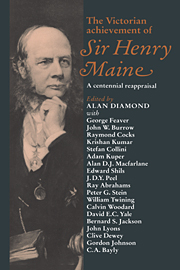Book contents
- Frontmatter
- Contents
- Notes on contributors
- Foreword by Sir John Lyons
- Introduction
- 1 The Victorian values of Sir Henry Maine
- PART 1 MAINE AND THE IDEA OF PROGRESS
- PART 2 MAINE AND THE SOCIAL SCIENCES
- 6 The rise and fall of Maine's patriarchal society
- 7 Some contributions of Maine to history and anthropology
- 8 Henry Sumner Maine in the tradition of the analysis of society
- 9 Maine as an ancestor of the social sciences
- 10 Ancient Law and modern field work
- PART 3 MAINE ON LAW, LEGAL CHANGE AND LEGAL EDUCATION
- PART 4 MAINE AND INDIA
- Appendix: the conference programme
- Bibliography
- Index
9 - Maine as an ancestor of the social sciences
Published online by Cambridge University Press: 04 September 2009
- Frontmatter
- Contents
- Notes on contributors
- Foreword by Sir John Lyons
- Introduction
- 1 The Victorian values of Sir Henry Maine
- PART 1 MAINE AND THE IDEA OF PROGRESS
- PART 2 MAINE AND THE SOCIAL SCIENCES
- 6 The rise and fall of Maine's patriarchal society
- 7 Some contributions of Maine to history and anthropology
- 8 Henry Sumner Maine in the tradition of the analysis of society
- 9 Maine as an ancestor of the social sciences
- 10 Ancient Law and modern field work
- PART 3 MAINE ON LAW, LEGAL CHANGE AND LEGAL EDUCATION
- PART 4 MAINE AND INDIA
- Appendix: the conference programme
- Bibliography
- Index
Summary
In a well-known paper, ‘Pietas in ancestor worship’, which chiefly concerned itself with ethnographic data from West Africa, Meyer Fortes (1970) sought to extend his generalizations about ancestor worship to other situations where men feel awe and respect towards the founders of the groups to which they belong. He instanced the sentiments that might be felt by the Fellows of a Cambridge college towards their predecessors. Of Trinity Hall's pietas towards Sir Henry Maine we are in no doubt. The chapters of this volume are evidence of the great respect in which Maine has long been held as an ancestor of the social sciences.
I say ‘ancestor’ rather than ‘founding father’ – the sobriquet more commonly applied by sociologists to those whom they claim as the founders of their discipline — to indicate that paradoxical combination of qualities which West Africans attribute to their ancestors. Ancestors are dead beings of the past, who are yet a present force, beings who interact with the living. L. T. Hobhouse will serve as an example of a founding father who is not an ancestor in the lively West African sense (notwithstanding Collini, 1979:5). As Edward Shils reminds us (p. 143 above), intellectual ancestors are different from biological ancestors – yet not so different from the socially recognized ancestors of West Africa – in that to a large extent they may be adopted posthumously by those who choose to regard themselves as their descendants.
- Type
- Chapter
- Information
- The Victorian Achievement of Sir Henry MaineA Centennial Reappraisal, pp. 179 - 184Publisher: Cambridge University PressPrint publication year: 1991

